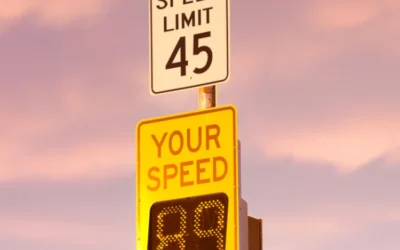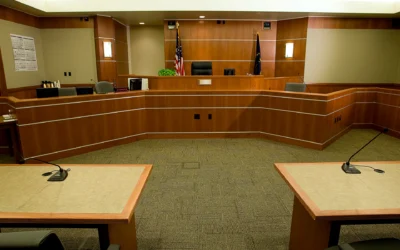Can I Reduce The Penalties For A Criminal Traffic Ticket in Arizona?
There are a variety of consequences that can result from a criminal traffic ticket conviction. Some are more serious than others. For most people, the issue at the top of the list is having to disclose a criminal conviction on a job, school, or immigration application. After that, drivers are worried about how a conviction will affect their driver license, and how it will impact their insurance rates.
It is important to understand that there is almost always an opportunity to improve on a criminal charge. We receive a lot of calls from drivers who just showed up to court by themselves and plead guilty. They didn’t understand until it was too late that they had other options. Just because you did it, doesn’t necessarily mean you have to plead guilty!
Understanding Criminal Traffic Tickets in Arizona
Definition of criminal traffic violations vs. civil traffic violations
When a charge is criminal, it means there is the legal potential for jail time and probation. For civil violations, there is no chance for jail time or probation. This is the primary practical distinction. Beyond that, criminal charges generally allow for more severe financial penalties than civil violations, with some exceptions.
Examples of common criminal traffic offenses in Arizona
The most common criminal traffic violation we see is criminal speeding, by far. After that, we frequently see reckless driving and DUI charges. For drivers of commercial motor vehicles, we most commonly see violations for failing to stop at ports of entry and then logbook-related charges.
The Consequences of Criminal Traffic Tickets
Overview of potential penalties (fines, points on license, jail time)
The vast majority of criminal traffic violations are misdemeanors. Misdemeanors are less serious than felony charges. A conviction for a misdemeanor generally does not result in the loss of any rights, whereas a felony conviction does result in the loss of rights.
In a worst-case scenario, the worst misdemeanor charges carry the potential for up to 6 months in jail, up to 3 years of probation, and up to $2,500 (plus surcharges, which will bring it close to $5,000). Some criminal traffic violations involve points on the driver’s license, ranging from 3 points for something like criminal speeding, up to 8 points for something like a DUI or aggressive driving.
Long-term implications on driving record and insurance rates
Check out our post on driver license points. Any moving violation, whether criminal or civil, carries points. Points are simply a way for ADOT (Arizona Department of Transportation) to weight the severity of violations and determine if they need to take action against the driver.
Insurance companies don’t care about points. The insurance company may care about the actual violation, but the only entity that cares about points is ADOT.
It is difficult for us to answer what impact a criminal traffic ticket conviction will have on insurance premiums. This seems to vary by insurance company, and driver. For example, a middle-aged, married driver with a clean driving history will probably be less affected by a ticket than an 18-year-old single driver with a couple prior tickets.
Exploring Options to Reduce Penalties
Defensive Driving School
Defensive driving school is a diversion program. See our post about defensive driving school for more detail. In short though, defensive driving school is not available for criminal traffic tickets. The one exception is criminal speeding. In the case of criminal speeding, the judge has the discretion to permit defensive driving school as an option. The judge doesn’t have to offer this, and many judges don’t. The availability of this option varies wildly between judges.
Negotiating with the Prosecutor
-
Importance of legal representation in negotiations
The vast majority of cases are resolved with a negotiated agreement called a plea agreement. It can be extremely beneficial to have a good attorney in your corner when trying to negotiate a favorable outcome.
We’ve seen it all too often – an attorney is a real @$$ towards the prosecuting attorney, and the prosecuting attorney then refuses to work with them. This is a real disservice to that attorney’s client.
It is possible to advocate strenuously for one’s client, but do it in a way that is professional and respectful towards the prosecutor and the judge.
It is critical for your attorney to have a good relationship with the court and the prosecuting attorney. This is especially true when there is no defense argument – when you are relying simply on a clean driving history and your good character to get an improved result.
-
Possible outcomes of negotiating reduced charges or penalties
When negotiating a resolution, the range of outcomes is broad. With a negotiated agreement, you aren’t necessarily bound to what might be possible based on the law.
For example, you could negotiate a situation wherein you do xx hours of community service and don’t get any additional criminal charges for x months, and then the prosecution agrees to dismiss the charges.
It is often possible to negotiate a charge down to a less serious charge. For example, we are often successful at negotiating a criminal speeding charge down to a civil speeding violation, thereby avoiding a criminal conviction for our client.
Sometimes, just avoiding jail time or a license suspension is a great negotiated outcome.
-
How plea bargains work in traffic cases
A plea bargain, or plea agreement, is a written agreement between the defendant and the prosecutor that resolves the case. Usually, a plea agreement will spell everything out and fully resolve the case. Some plea agreements may leave certain details, such as the total fine or probation, to the court.
Once the defendant and the prosecution reach an agreement, they put it in writing. Everyone signs it. Normally the court will then hold what is called a change of plea hearing to finalize the agreement. At the change of plea hearing, the judge will review the plea agreement, ask the defendant questions to make sure the defendant understands what is happening, and then sign off on the plea agreement.
Contesting the Ticket in Court
-
Steps to contest a ticket (notifying the court, gathering evidence)
Step 1 is to plead not guilty at the arraignment date (usually the date on the ticket). After the defendant pleads not guilty, the court will typically set a new court date for a pretrial conference.
Step 2 involves speaking with the prosecution about a potential resolution and conducting discovery (gathering information). This can happen at a pretrial conference. There will usually be several pretrial conferences while the defendant gathers information that could be useful in mounting a defense. Settlement discussions may continue during this time too.
-
Importance of presenting a strong case (witnesses, documentation)
Step 3 involves presenting mitigating details for the defendant and making any defense arguments to the prosecution in an effort to negotiate a favorable outcome. This step is very important because it goes straight to the resolution of the case. Either the mitigating details and argument is sufficient to achieve the desired outcome, or if no agreement can be reached, then the defendant has all of the information at hand to proceed to trial.
-
Potential outcomes from a court hearing
Step 4 is resolution. This will either be a change of plea hearing if the defendant and the prosecution reach an agreement, or a trial if no agreement can be reached.
If the resolution is by plea agreement, then the outcome is known ahead of time.
When the resolution is by trial, the outcome is uncertain. It is impossible to know how a trial will turn out. Regardless, the outcome is binary – either the defendant will be found guilty, or not guilty.
If found guilty, the court will impose whatever sanction the court deems appropriate, within the scope of what is allowed by the law.
Presenting Mitigating Evidence To Reduce The Penalties Of A Criminal Traffic Ticket
Demonstrating Good Driving History
-
A clean driving record can influence the court’s decision
A clean driving record can be very helpful in achieving a good outcome. For example, many courts want to see a driving record before deciding whether to grant a request for defensive driving school in a criminal speeding case.
A prosecutor is much more willing to negotiate with a defendant with a clean driving record than with a defendant who has many prior violations.
-
Obtaining and presenting driving records
Check out our post on obtaining a copy of a driving record. Often, the prosecution will already have access to this.
Showing Compliance with Traffic Laws Post-Ticket
If a defendant has a pending criminal traffic case and gets an additional ticket, this can certainly impact a prosecutor’s willingness to negotiate. It could also impact the severity of a sanction that the court might impose following a trial.
In other situations, a defendant might have worked out a plea agreement with the prosecutor wherein they are on probation for a period of time. During probation, if the defendant were to get a new traffic ticket, it could jeopardize the plea agreement. In other words, upon learning of a new ticket that violates the terms of the plea agreement, the prosecution may seek to unwind the plea agreement.
Conclusion
Summary of strategies to reduce penalties for criminal traffic tickets in Arizona
Any penalty reduction strategy has two parts: Present the defendant in the best possible light, and present any legal or factual defenses.
Was the defendant polite and cooperative with the police? Does the defendant have a clean driving record? Is the defendant a demonstrably good person – is there a history of community service, church involvement, charitable giving, etc.?
From a legal standpoint, a defendant is looking to see: Can the prosecution prove the legal elements of the charge? Did the citing officer do anything wrong, or fail to do something? Is the citing officer still available to testify at trial? Is there evidence that shows the defendant is innocent?
Seek legal advice for personalized assistance
Every case is different. Every prosecutor is different. Every court and judge is different. There are a lot of moving parts in a criminal case. If you are concerned about getting the best possible outcome in your case, an experienced attorney is going to give you the best chance of achieving that goal. As an added benefit, an attorney will take the lead and do the work in your case, and alleviate a lot of stress and uncertainty for you.
At the very minimum, at least talk to an attorney who offers free consultations. Even if you ultimately don’t end up hiring an attorney, talking to an attorney can give you some valuable direction.
Email For A Free Consultation
And speak with an experienced criminal traffic attorney.
Latest Blog Posts
3 Things Arizona Drivers Need To Know About Speed Limits
You can be charged with a crime for exceeding the speed limit by more than 20 mph. Arizona has a criminal charge called Excessive Speed, a.k.a. criminal speeding. If you are driving more than 20 mph over the posted speed limit, you can be charged with excessive speed....
What Counts As Evidence In Court in Arizona?
What Counts As Evidence In Court?In Arizona, what counts as evidence and how that evidence can be presented in court is determined by the Arizona Rules of Evidence. Except for civil traffic cases, where the rules of evidence don’t apply. Please note, lawyers spend an...
Chris Rike is a founding partner of Traffic Law Guys, an Arizona law firm committed to protecting the rights of drivers facing criminal traffic charges.



0 Comments